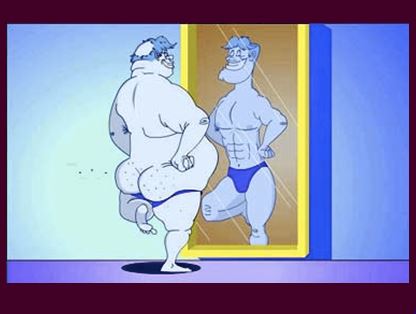In our culture today, stress is often a badge of honor. There seems to be an association in our conditioning between stress and success. The consequences of chronic stress on our mental state and physical health, however, is extremely serious and can take months to repair. In some cases the damage is irreversible.
At Hawaii Naturopathic Retreat we specialize in lifestyle change programs that are individually designed to help patients with several chronic physical or mental illnesses. Oftentimes stress, anxiety and fear is an underlying theme that affects many patients’ health. During our programs we focus on helping patients understand the dynamics of stress, anxiety and fear in their lives and consequent illnesses.
Earlier this year, our medical director, Dr. Maya Nicole Baylac, was invited to appear as a guest speaker at the highly anticipated , “Peak Experience” event at the Omni San Diego Hotel, May 21 -23, 2014. This event is widely known as one of the country’s pre-eminent events for entrepreneurial business owners and was hosted by the renowned real estate success expert and motivational speaker Brian Buffini.
It was on exactly this topic of stress, anxiety and fear and strategies for managing it that Dr. Baylac spoke. The presentation was very well received and we would like to provide others the opportunity to benefit from the material presented. The article that follows is based on the transcript of the presentation. In addition, the presentation can be viewed on SlideShare while reading the article.
Article based on transcription of guest appearance presentation at Peak Experience, San Diego, 2014:
All images and graphics in the article and presentation are courtesy of © Buffini & Company.
Stress, Anxiety and Fear in Modern Society and Strategies for Coping
In our culture today, stress is often a badge of honor. There seems to be an association in our conditioning between stress and success. The consequences of chronic stress on our mental state and physical health, however, is extremely serious and can take months to repair. In some cases the damage is irreversible.
Levels of Stress, Mental Emotional Well-Being and Stress
We frequently see the negative physical effects of long-term unresolved stress on our patients at Hawaii Naturopathic Retreat. In order to understand stress we need to get familiar with the different levels of stress that exist and we need to distinguish between them. Usually when people talk about stress they are referring to abnormal chronic stress.
Chronic stress is unresolved stress and it has very serious effects on our health. On the other hand normal or occasional resolved stress is beneficial. It stimulates our creativity and it motivates us.
Let’s take some examples:
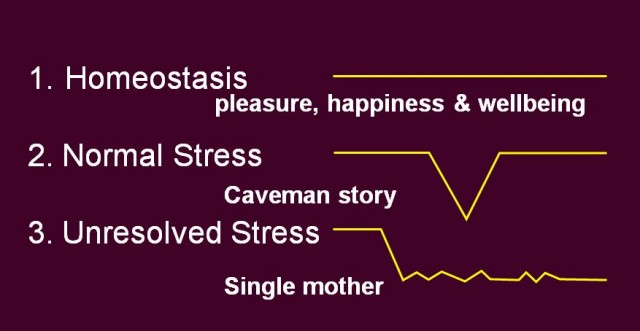
Levels of Stress: Homeostasis, Beneficial Resolved Stress and Harmful Chronic Stress
1. Homeostasis is a State of Inner Balance and Relaxation
Normally we feel at peace and trust the environment. We are in a state of inner balance. When challenging or unexpected circumstances happen, our inner balance is threatened, we resist the negative change and feel tension. This is stress.
2. Beneficial Resolved Stress: Temporary Rupture of Balance
Resolved Stress is beneficial. Stress motivates us and stimulates our creativity. This is what the brain is naturally hardwired for. Let’s take the example of the caveman: In prehistoric times, if the weather was getting colder than usual, the caveman felt uncomfortable and caveman’s survival was threatened. Caveman became motivated to create a shelter, build a fire and make warm clothes in order to be more comfortable. When caveman finally became warm his body came back to baseline and signaled to his brain that he was safe by sending positive feedback in the form of a feeling of pleasure and comfort. Stress got resolved and the body went back to its baseline function: rest and digest. In this case stress had a very positive function. It stimulated creativity and prevented the cave man from freezing to death.
3. Harmful Chronic Stress: Chronic Rupture of Balance, Distress
Unresolved Stress or chronic stress is detrimental. If the poor climatic conditions continued day after day and we were unable to resolve the situation, either because of lack of wood or building material, and the body continued to send a message of discomfort, we would have experienced distress. Today poor climatic conditions have been mostly resolved, but we have to deal with financial and national insecurity and environmental stress. For instance, a divorced woman who is working three jobs and taking care of her two children does not have any downtime and she may be worried that she will lose her job and not have enough money to support her family. In a world of job insecurity, she worries constantly, she does not get back to baseline, her stress is now chronic and she is at risk for various stress related illnesses.
Chronic Stress: The Mental, Physical, and Behavioral Health Consequences
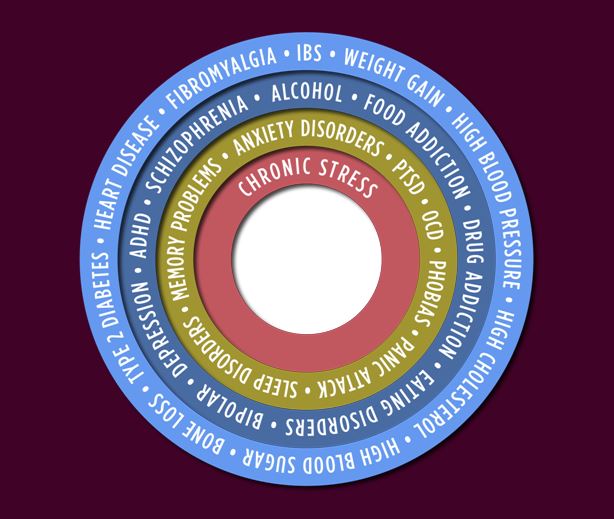
The Mental, Physical, and Behavioral Health Consequences
Chronic stress causes a multitude of mental and physical illness:
- Anxiety
- Depression, ADHD, Schizophrenia
- Sleep problems, trouble falling asleep
- Memory and concentration impairment
- Digestive problems, IBS
- Fibromyalgia
- Heart disease
- Weight gain, fat deposits on the belly, face and neck
- High blood pressure, high cholesterol, high blood sugar
- Type 2 diabetes, insulin resistance
- Suppressed immunity with risk of infections
- Bone loss
Why Is Stress So Bad For Our Health?
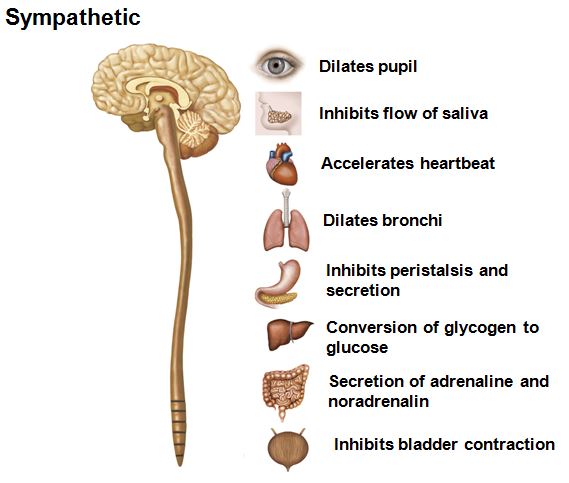
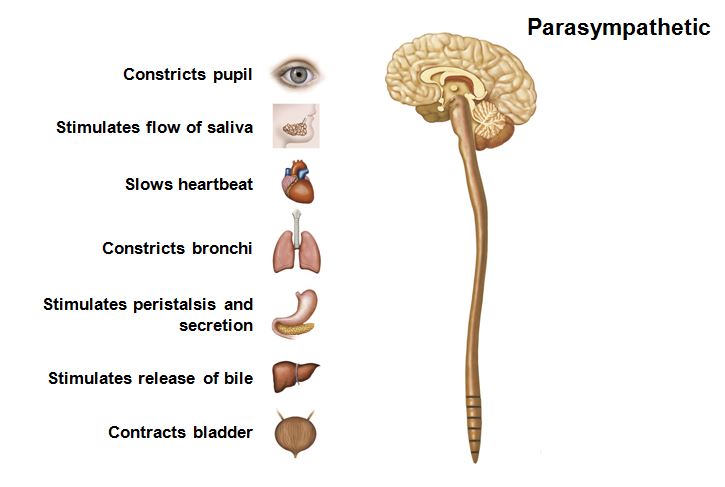 Disrupts normal response to stress
Disrupts normal response to stress
1. perceived a threat
2. sympathetic reaction
3. stress hormones release
4. threat is resolved (fight or flight)
5. return to baseline (parasympathetic)
Chronic stress disrupts the natural hardwired (inherited) response to resolve stress. This inherited hardwired response is a feedback loop. The brain sends a message via hormones to the adrenal glands to secrete cortisol. Cortisol sends a message to multiple organs to get ready for action. The brain gets the message that the body resolved stress. The adrenal glands get the message to stop producing cortisol.
This response starts with the perception of danger by the brain. When our brain perceives danger whether it is real or not (surgery, fasting, body injury, trauma memories, or fears projected into the future), it sends the message to the adrenal glands to secrete the stress hormones adrenaline and cortisol. The adrenal glands are two small glands sitting on the top of our kidneys.
Adrenaline and cortisol do two things:
1. They activate the body systems that will prepare us to face the challenging situation:
- a. Cortisol takes amino acids from the muscles and calcium from the bones to put them in the blood.
- b. Blood is sent to the large muscles of the body,
- c. Blood pressure, heart rate and blood sugar are increased to prepare for extreme action and
- d. The immune system and digestion are inhibited.
2. A feedback loop tells the brain to stop cortisol production.
Disruption of this closed system by chronic stress causes serious problems.
Chronic Stress
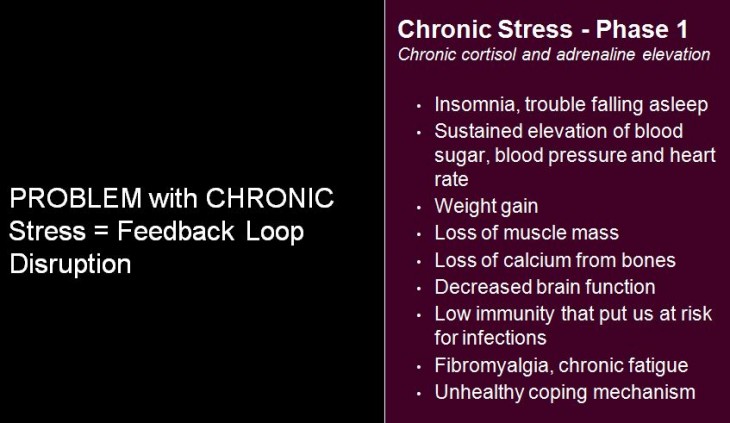
Chronic stress results in:
- Chronically elevated cortisol and adrenaline
- Chronically increased blood pressure, heart rate and blood sugar
- Chronically inhibited immune system and digestion
When we experience chronic stress, the body is constantly in the alert mode and cortisol and adrenaline are secreted in large amounts and chronically elevated in our blood. Chronically elevated cortisol levels are responsible for the illnesses mentioned above.
Chronically elevated levels of cortisol and adrenaline cause several issues:
- metabolic problems
- muscle break down
- loss of calcium from the bones
- fat deposition around the belly
- a moon face
The chronic over production of stress hormones depletes the nutrients utilized in their synthesis and the production of stress hormones decreases to a level that may be dangerously low. This state is called adrenal fatigue.
Chronic Stress and Adrenal Fatigue
The over production of stress hormones depletes the adrenal reserves. The adrenals produce less and less hormones. This stage is called adrenal fatigue.
The symptoms of adrenal fatigue:
- Allergies
- Depression
- Intractable fatigue
- Low blood pressure
- Low libido
- Hypoglycemia
- Difficulty losing weight
- Exhausted in the morning and wired at night
- Cravings for salt and sugar
- Excessive thirst and urination
- Inability to deal with stress
- Fibromyalgia
- Chronic fatigue
- Chronic inflammation
Anxiety
At Hawaii Naturopathic we often refer to ANXIETY and not stress. Many people would not readily think they struggle with anxiety. Anxiety is one of the consequences of stress. Not everybody who experiences stress will experience anxiety but many will and many will not be aware of it.
People come to Hawaii Naturopathic Retreat for physical issues such as weight loss, high blood pressure, high cholesterol, smoking cessation, digestive problems or because they are in crisis. These people are often unaware of their anxiety because they camouflage it under maladaptive coping mechanisms that became a secondary problem such as excessive drinking or eating or avoidance behaviors.
To eliminate these unwanted coping strategies, we need to address the cause of anxiety.
Anxiety is very common in modern life, poorly detected and even more poorly treated.
Anxiety is the most common mental health consequence of chronic stress.
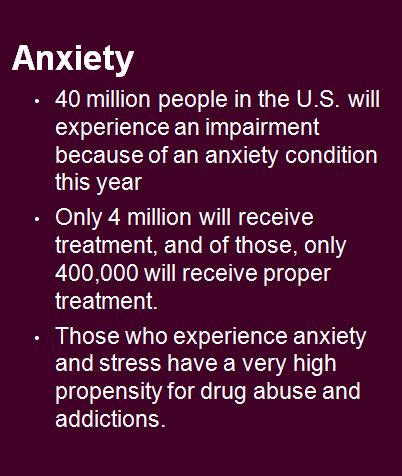
Anxiety Statistics
What is Anxiety and How Does it Manifest in a Person’s Life?
Anxiety is defined as a state of anedhonia. Anedhonia is a lack of pleasure. In normal circumstances, we feel trust in the environment and this trust generates pleasure. Our brain secretes oxytocin, the pleasure hormone. When we are chronically stressed, we perceive the world as hostile and we feel unsafe or anxious and cortisol is secreted.
On a day-to-day level, anxiety can manifest itself by irritability, anger, impatience, worrying, bad dreams, and negativity.
Normal and Pathological Anxiety
There are different levels of anxiety. Being anxious prior to taking an exam or a job interview is normal. And so is social anxiety before giving a presentation. The state of anxiety disappears when the challenging situation is over.
However, there are cases when the anxiety continues pass the resolution of the stressful situation. In these cases we see anxiety disorders. Anxiety disorders include:
- post-traumatic stress syndrome
- phobias
- general anxiety disorders
- obsessive-compulsive disorder
- social anxiety disorders
- panic attack
- agoraphobias
They disorders are classified separately by the DSM-IV (The Diagnostic and Statistical Manual of Mental Disorders), but we find at Hawaii Naturopathic that more than one condition is usually present in each individual. For instance, someone with post-traumatic stress disorder also suffers from phobias and obsessive-compulsive disorder.
These disorders can severely limit people’s lives to the extent where they cannot work or participate in normal social activities. Their life is centered on manipulating situations to feel safe. Feeling safe is part of the homeostatic balance.
Why Does Such a Large Number of People Experience Anxiety?
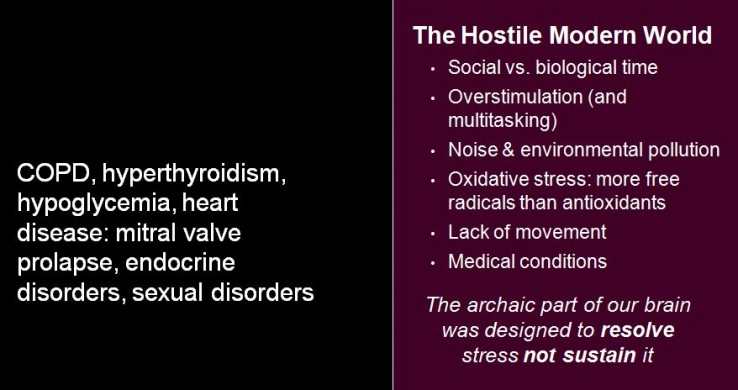
Modern World
Although we have apparently adjusted to social time, the archaic part of our brain was designed to resolve stress and not to handle chronic stress.
- Overstimulation
- Social time versus biological time
- Multitasking
- Noise and environmental pollution
- Lack of movement
Medical conditions: COPD, hyperthyroidism, hypoglycemia, heart disease: mitral valve prolapse, endocrine disorders, sexual disorders
Our modern world contributes to anxiety. The overstimulating modern world can be perceived as a threat by the archaic brain. Advertisements, electrical lights, traffic, TV, news and enhanced flavors from food over-stimulate our senses and may confuse our brains.
The way humans have manipulated time and space to match our social needs is in conflict with our biological needs. Appointments, deadlines, alarm clocks and being on the go all the time can be perceived as a hostile environment by our biological clock. These serve as constant reminders that we need to fit into a mold rather than let our actions unfold from within. Planning for future activities prevents us from enjoying life in the present at our own rhythm.
Or, consider multitasking. Multitasking is stressful to our body systems because our biological nature is not adapted to have multiple focuses and overstimulation can stimulate the stress hormones and create anxiety.
Noise pollution and environmental pollution create oxidative stress and can overwhelm the detoxification systems of the body and create emotional stress and anxiety.
Sitting at a desk for many hours is stressful on the body designed to move around.
Medical conditions: Heart disease such as mitral valve disease, endocrine disorders, chronic obstructive pulmonary disease (COPD), hyperthyroidism, hypoglycemia send messages of distress to the body.
And What About Fear?
Fear is another contributor to stress and anxiety. Some fears are easily identified. While others are much deeper and more challenging to understand.

Fear is the main cause of anxiety. When there is no fear there is no stress or anxiety. Some fears are archetypes; they belong to the human species: fear of darkness, fear of death, and fear of being alone. Some other fears are specific to the individual such as fear of intimacy or fear of being vulnerable or fear of loving and being loved, or fear of emotions or fear of losing control.
Here are some examples of how fear enables stress and anxiety:
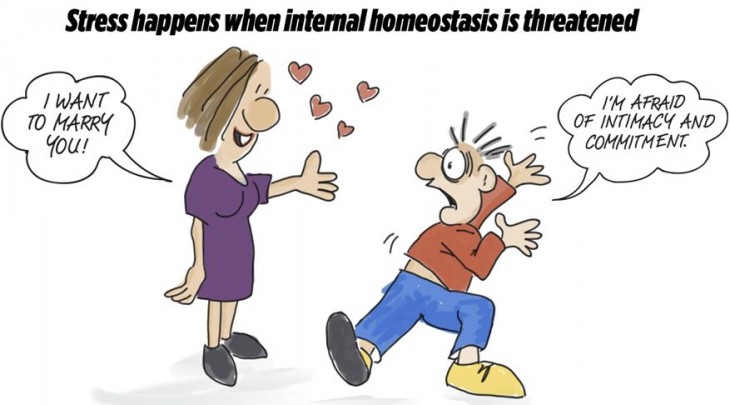
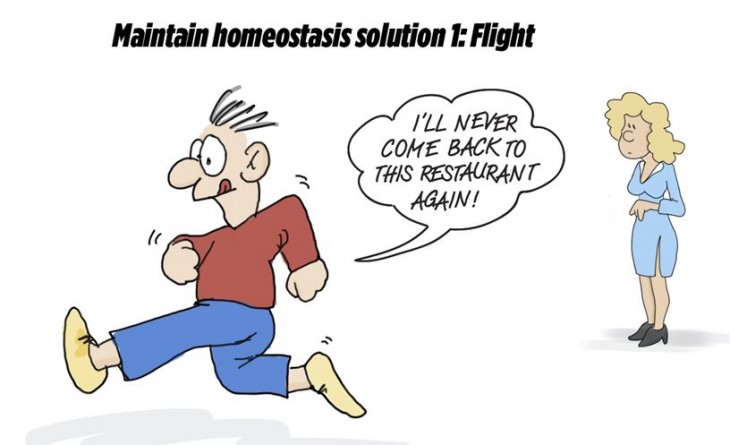
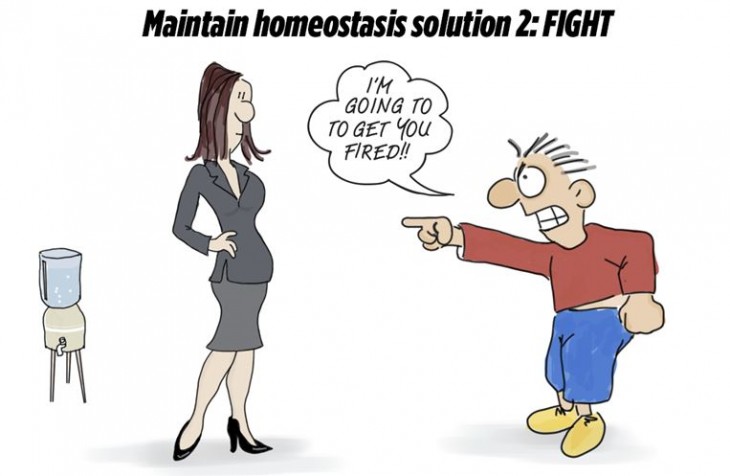
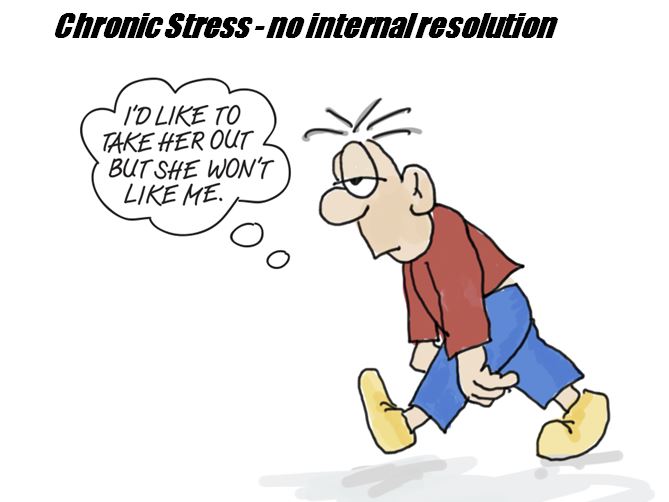
How do we help people deal with fear at Hawaii Naturopathic Retreat?
Revealing the Nature of Fear
Nature of fear: fear is a projection into the future that something bad is going to happen.
We sabotage ourselves and limit our actions by anticipating a negative outcome to our actions. We can use mindfulness and deliberately choose to substitute a positive outcome to our projection in the future. The mind has great power and we can attract what we intend.
Fear is not real. It is a construction of our mind. Face fear and it will disappear.
We spend a lot time avoiding our fears. People medicate themselves with dangerous pharmaceutical drugs or recreational drugs or alcohol to get disinhibited and not feel their fears. When all of these maladaptive coping mechanisms are taken away and you face your fear, do what you fear the most, you can see that fear is just an illusion of the mind.
By staying with the feared situation and experiencing the fear we realize that the fear is only a construction of our mind and is not real. Fears are created by the mind and are non-existent. Avoiding fear intensifies fear and makes it appear real to the mind. Instead, we need to experience the fear and question its reality. When fear is lost freedom is gained. Fear is limiting, constrictive. When there is no fear we experience nothingness, godliness, freedom, love and trust. You can deal with many simple fears or even phobias this way. For example fear of darkness, diving, and spiders. Face them, experience them and question its reality.
Nature of fear: brain pathways from conditioning.
In the case of our cartoon hero who had a difficult childhood living in a hostile environment and who was afraid of intimacy, confronting this fear may take more in depth psychotherapy to change brain conditioning. His brain is sending him the message that the world is unsafe and that he cannot be vulnerable. He will have to learn that he can control his environment as an adult and that the world is safe, by repeating new behavior again and again until the brain creates new pathways and does not slip back into the old ones.
At Hawaii Naturopathic Retreat, we help people with exercises to build trust and love –
- Practice trust, the antidote to fear
- Make positive statements about ourselves
- Practice gratefulness
- Practice meditation to align with the present
- Psychotherapy to deal with past traumatic events
Personal Stories and Beliefs
When we help someone make a lifestyle change at Hawaii Naturopathic, we often need to pull apart an individual’s personal story. Why do we have to do that? Why are these stories we tell ourselves so damaging to our well-being?
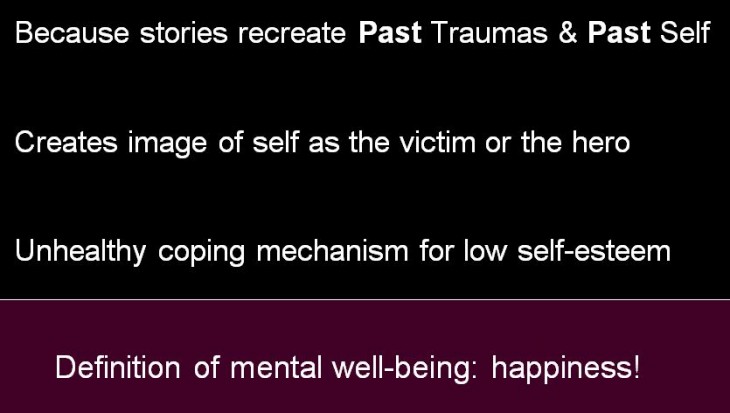
- Stories about ourselves represent a belief of who we are
- Stories are maladaptive coping mechanism for past traumas and feelings of insecurity
- Stories are a projection of the past into the present, the same way fears are projections into the future
- Both are unreal and detrimental to our well-being because they prevent us from change and experiencing the present
- Stories and fears prevent us from being happy
Belief of Who We Are Rather Than Who We Actually Are
For instance, we tend to create a belief of who we are based on a past strong traumatic experience. We think “I am a victim of an assault” and the brain replays the original trauma although we are safe right now. For instance, a woman was betrayed and hurt in the past and she carries this story in her present life. She cannot trust a man and is afraid of intimacy because she may be hurt and fails at building a relationship with another person.
Attachment to Traumatic Experiences From the Past
In post-traumatic stress disorder the past traumatic event(s) continues to be re-enacted. The violence is not there anymore, but the brain sends messages of fear. It is like we go back over and over to these thoughts because we have become addicted to them. Sadness, humiliation, anger, pride, and shame; the ego thrives on these thoughts.
Stories are Maladaptive Coping Mechanisms, an Attempt to Compensate for a Lack of Self-Esteem and Insecurity
For instance, “I am a successful business man”. Or, “I am such an attractive woman. I want to attract admiration and be acknowledged for my value.” Because we feel unvalued inside a man may want to project this image of success or a woman an image of beauty. We try to make success and physical beauty the antidote for insecurity and low self esteem. However, the real issues will eventually have to be addressed, because these maladaptive coping mechanisms will not work forever.
Stories Serve a Purpose in the Present
They manipulate relationships to attract a desired reaction. We want to inspire pity or admiration or credibility by projecting the idea that we were abused and cheated or that we are great and knowledgeable to compensate for the feeling of insecurity. We are addicted to feel a certain way and we create a situation with others so that we can experience these feelings over and over again. For instance a woman who was betrayed in the past by her brother will identify to that story and repeat it over and over again to inspire pity for herself and blame for the brother. She wants to attract sympathy by presenting herself as a victim and inspire disapproval for her brother.
Stories May be an Attempt to Compensate for the Lack of Self-Esteem and Insecurity or Protect our Vulnerability
We are looking for approval because deep down the same feeling of insecurity and poor self esteem. We keep repeating this story because we need to be reassured that we are OK because no matter how much money knowledge and success we have accumulated deep inside we still feel vulnerable, doubtful and unsafe. Stories show a desire to control the perception of the other and avoid being vulnerable. I am guiding the other in the discovery of who I am rather than letting the other discover me. It shows my desire to control the perception of the other about me. Repeating a story constantly is like wearing a mask.
Like Fears Stories are Not Real
Hanging on to a story is hanging on to an image of ourselves. It is a construction of our mind and it is unreal. It is a fear of living the adventure of the present. Fear and stories prevent us from being in touch with our deep spiritual self. Fears and stories are on the way to an honest and fulfilling relationship with the other. In order to be truly happy we need to let go of our fears and our stories. When fear is gone we trust and love.
At Hawaii Naturopathic we believe that carrying a story from the past prevents us from being happy and accepting our present life fully. When we live life as a story we deprive ourselves from experiencing life as novel.
Insecurities
It seems insecurity is always a scriptwriter in our personal stories. None of us like to be told we’re insecure… but how does a person’s insecurities have a negative effect on their health and well-being?
We are hardwired to feel secure; however our culture and social environment presents a challenge to this natural programming.
Job Insecurity

A study on job insecurity shows how it is tied up with anxiety, elevated heart rate and drug use
“Workers’ responses to the stress of perceived job insecurity in the shorter term could be emotional (anxiety, tension, dissatisfaction), physiological (elevated heart rate, increased catecholamine secretion) and behavioral (drug use, absenteeism, lack of concentration) [Gazzanizga and Heatherton 2003; Heaney, Israel, and House 1994].
Social Gender Stereotypes
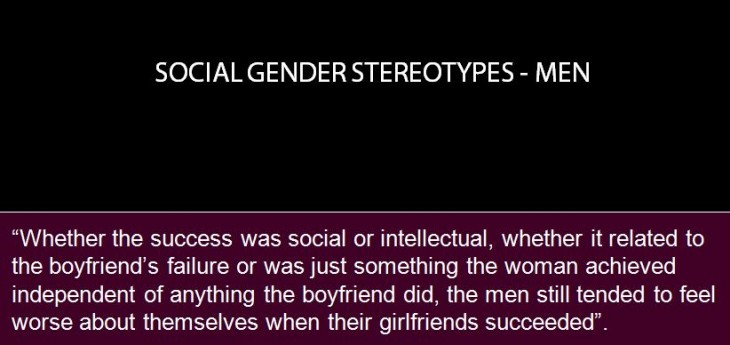
Self-esteem is based on gender stereotypes:
- Male stereotype: smart, self-esteem based on intellectual image
- Female stereotype: pretty, self-esteem based on body image
According to a recent study, men (heterosexual) feel insecure when a female partner is successful in an area where they are not. According to men gender stereotypes, men are supposed to be smarter and financially more successful than their female partners and they feel insecure when their partner succeeds where they don’t. However, women do not feel insecure when men are financially more successful than them and enjoy their partner’s success.
“Whether the success was social or intellectual, whether it related to the boyfriend’s failure or was just something the woman achieved independent of anything the boyfriend did, the men still tended to feel worse about themselves when their girlfriends succeeded”.
Findings were similar in two more studies conducted in the Netherlands. The Netherlands boasts one of the smallest gender gaps in labor, education and politics, according to the United Nations’ Gender Equality Index. However, like American men, Dutch men who thought about their romantic partner’s success subconsciously felt worse about themselves than men who thought about their partner’s failure, according to both studies. They said they felt fine but the test of implicit self-esteem revealed otherwise.Source: “Gender Differences in Implicit Self-Esteem Following a Romantic Partner’s Success or Failure,” Kate A. Ratliff, PhD, University of Florida, and Shigehiro Oishi, PhD, University of Virginia; Journal of Personality and Social Psychology, online Aug. 5, 2013.We may attribute this sense of insecurity to the rising number of men seeking partners in cultures where women continue to observe their conventional roles.In contrast female insecurity has to do with appearance.
Self-Esteem and Body Image
“Men looking in the mirror are likely to be either pleased with what they see or indifferent. Research shows that men generally have a much more positive body image than women – if anything, they may tend to overestimate their attractiveness.”“Most of us are aware of our society’s emphasis on the importance of appearance, and we know what the socially sanctioned standards of beauty are. But not all of us accept or ‘internalize’ these standards: strong-minded individuals who reject current standards are more likely to have a positive body image.”
Dealing with Insecurity: Challenging and Changing Our Core Beliefs
Facing insecurities, resolving past traumas, letting go of our roles, and what we think we should be, all these are part of the psychotherapeutic process and spiritual growth.Insecurity is the result of a core belief that we are not good enough and that we should be different. We reject ourselves and do not think that we are worthy of love because we have this image of the perfect self. Magazines, TV, and school form this body image for women and the intellectual image for men. This image of perfection causes lack of self-esteem and confidence. We compare with this image and reject ourselves for not meeting the image of perfection. We tell ourselves, “I am not worthy or good enough”.
Challenging Our Stories
Stories are like a mask hiding our insecurities, lack of self-esteem and fears and it all belongs to the life of our ego. Ego can be repaired with psychotherapy but ultimately the best treatment is transcendence of the ego and tapping into the true source of life.When we feel insecure we constantly search for security because security is part of our homeostatic balance. We present a story to obtain the appreciation or recognition or validation or pity or what it is that we need the most to feel validated. Yes, we need to present an image that says” I am successful”, “I am a victim”, or “I am a great person”. Our egos feed off of these stories.
Resolving Our Past Traumas
Insecurity Is Associated With Anxiety and Post-Traumatic Stress Syndrome
A normal person will process the events from their lives as they go through life and learn from their different experiences. The learning process strengthens the ego and the person feels secure. Sometimes, because of the pain involved in some experiences, we cannot face these experiences and incorporate them in our ego. These experiences were powerful and made a huge impact in our lives and our brain takes us back to these experiences as they need to be processed.
Resolving Our Conditioning
This feeling of insecurity may come from childhood. Maybe our mother was insecure herself and transmitted that feeling to her children. The mind like the body always tries to come into balance (homeostasis). We are programmed to be happy and we search for this feeling of being OK when we think that we are not OK. Feeling secure is hardwired in us.Steps to resolve insecurity -Group therapy: Men’s groups and women’s groups are useful.
Psychotherapy: “Psychotherapy consists in the parting away of all that stands between us, the props, masks, roles, lies, defenses, anxieties, projections and introjections, in short, all the carryovers from the past, transference and countertransference that we use by habit and collusion, wittingly or unwittingly, as our currency for relationships. The politics of experience, the psychotherapeutic experience.” [R.D. Laing 1967 (psychiatrist)]
Longevity and Being Well-Derly
At Hawaii Naturopathic Retreat we focus on longevity. We talk of being well-derly; not elderly. There is no shortcut to aging well. It cannot be found in a pill or an injection. Aging well has a personal cost: engaging in healthy lifestyle habits, good nutrition, and a positive attitude is what we teach at Hawaii Naturopathic Retreat. It is never too early or too late to get started and it is very simple.
Aging Well
1. Avoid the diseases of old age with whole food nutrition and an active lifestyle.
Diseases of old age: Alzheimer’s, heart disease, diabetes, dementia and cancer are the result of oxidative stress coming from poor lifestyle, poor diets and mental-emotional stress.Cigarette smoking, excessive alcohol consumption, excess sugar and salt, processed foods containing chemicals create a chemical and heavy metal burden on the body responsible for diseases of old age.It is possible to avoid all the illnesses. It is a matter of leading a life in harmony with the laws of nature. Go to bed early and have a sleep, rest, be active, have friends and / or family, a life of purpose and passion and eat real foods, get some sun, laugh and not be so serious and stay in contact with nature.
To live a long life nutrition and an active lifestyle are key, mobility, passion, continued interest in life and not being so serious.
2. Avoid chronic stress: meditate, laugh, stay active
Chronic stress shortens our life. Chronic stress creates free radicals. Chronic stress is part of chronic disease and fear is at the core.Our goal is to prolong a healthy and happy life, not a debilitating life with a crippled body and mind.
How to reduce stress?
- STRESS MANAGEMENT
- Regular physical activity
- Mindfulness
- Social connectivity
- Sense of humor
- Sex
MOST IMPORTANT GO TO THE DEEPER LAYER AND DEAL WITH FEARS, INSECURITIES AND PAST TRAUMAS AND MAKE LIFESTYLE CHANGES TO ELIMINATE THE CRUTCHES.
Many people have come to Hawaii Naturopathic Retreat because they were unhappy, afraid and unhealthy. We designed lifestyle change programs for them based on their individual needs. These people detoxed their bodies, minds and emotions and moved on to achieve success on a path of happiness, health and longevity.
All images and graphics in the article and presentation are courtesy of © Buffini & Company

















